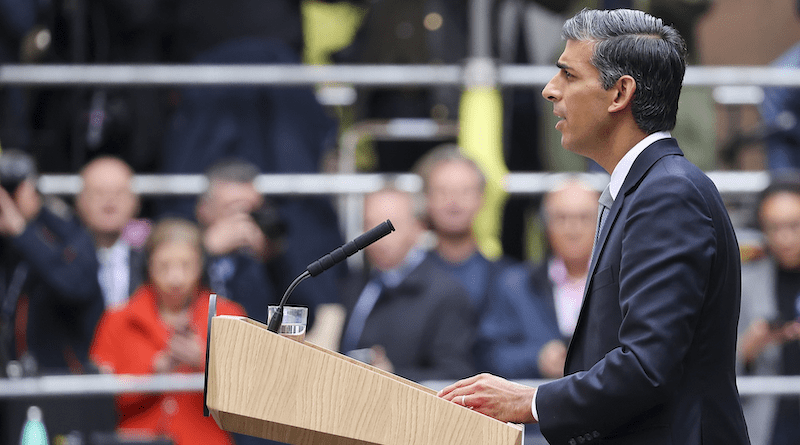Setbacks For Rishi Sunak As Key UK Elections Approach – OpEd
By Arab News
By Andrew Hammond*
Rishi Sunak faces his first major electoral challenge as UK prime minister on May 4, yet his government is on the rocks following the resignation last Friday of Deputy Prime Minister Dominic Raab.
More than half a year into his term of office, Sunak has had a very mixed start in 10 Downing Street. To be sure, he has not experienced a similar disastrous chain of events to his predecessor Liz Truss, which saw her prime ministership implode within 50 days. However, the premiership of Truss is an exceptionally low baseline from which to judge Sunak’s term. In practice, this has had some ups but a lot of downs too, including a significant number of Cabinet resignations for ethics-related reasons, starting with Cabinet Office minister Gavin Williamson last year and culminating (so far) with Raab last week.
To be fair to Sunak, there have been a small number of successes. This includes the negotiation of the Windsor Framework that seeks to resolve the challenges of the originally negotiated Northern Ireland protocol.
It is Raab’s resignation, however, that may well be more salient in terms of shaping the May elections. These ballots include district councils, unitary authorities and directly elected mayors in England, as well as all local councils in Northern Ireland.
A majority of the seats up for grabs were last contested in May 2019. In those ballots, the Conservatives lost more than 1,000 seats and control of several councils, while the Liberal Democrats managed to make the most gains. If the Conservatives lose 500 of the more than 3,300 seats they are defending across England to Labour on May 4, it would be the first time in more than two decades that the Conservatives are not the biggest local party in England.
While it is by no means sure that Labour will win a big majority at the next general election, a significant win for the party on May 4 would fuel the growing perception that the party will emerge with the largest number of MPs in Westminster next time. This is encouraging growing numbers of Conservative MPs to announce that they will stand down rather than defend their seats in the general election.
With the Conservatives almost certain to lose seats on May 4, an important question for the government will be whether it can subsequently regain any political momentum. This is possible, but is made less likely because it lacks energy after almost a decade and a half in power.
This is, in part, because so many ministers in Sunak’s Cabinet are holdovers from Johnson’s governments from 2019 to 2022 (a significant number of whom were in political exile under Truss), including Michael Gove, Oliver Dowden and Ben Wallace, who occupy the same roles as in Johnson’s last Cabinet. Other ministers who served in Johnson’s top team who are now in new Cabinet jobs include Sunak himself, James Cleverly, Grant Shapps, Gillian Keegan, Therese Coffey, Steve Barclay, Penny Mordaunt, Robert Jenrick and Suella Braverman.
However, even if the Conservatives have a very bad night on May 4, Sunak may yet escape a leadership challenge. This is, in part, because of the declining political fortunes of Johnson, whose standing within the party has slipped (perhaps only temporarily) recently.
Firstly, he last month received a grilling from the House of Commons Privileges Committee, where he was flustered by questions posed by a cross-party group of MPs, including Conservatives Bernard Jenkin and Charles Walker, about the so-called partygate scandal during the lockdown era of the pandemic. Added to this, Johnson had hoped to lead a major backbench rebellion against Sunak’s Windsor Framework, but this failed to materialize.
So, barring a major calamity in the coming months, Sunak is set to lead the Conservatives into the next general election, which will most likely be in 2024. But he has a massive political hill to climb.
The task is so difficult for Sunak because public opinion is widely skeptical of his government. He also knows that no party in modern UK political history has won five elections in a row.
So, he has a huge challenge ahead and he faces this in a context where Johnson (and indeed the much wider number of ministers leaving office in recent years, including Truss) could become significant political thorns in his side. In recent weeks, Truss has been renewing her push for a radical low-tax agenda in the face of the threat from nondemocratic states. In a recent speech, she argued that a “cartel of complacency” is damaging economic growth in the West and accused key governments of aiding China, Russia and others by refusing to offer tax cuts.
Taken together, this is why Sunak’s prime ministership is so perilously positioned. While he is now likely to last in office to fight the next general election, the political winds are blowing against him winning a fifth successive victory for the Conservatives.
- Andrew Hammond is an Associate at LSE IDEAS at the London School of Economics

